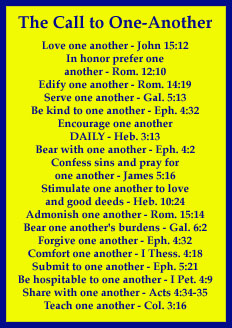Once In a Lifetime…
By Wayne Jacobsen
BodyLife • March 1997
O Lord, the God who saves me, day and night I cry out before you. May my prayer come before you; turn your ear to my cry. For my soul is full of trouble and my life draws near the grave. I am counted among those who go down to the pit; I am like a man without strength. I am set apart with the dead, like the slain who lie in the grave, whom you remember no more, who are cut off from your care. You have put me in the lowest pit, in the darkest depths. Psalm 88:1-6
These words from Psalm 88 echoed off the solid rock walls that surrounded us and sunk deep into our hearts. I was standing with about 20 others in a small chamber carved out of solid rock. Fifteen feet above us was a small hole that had been cut in the rock. Two thousand years ago that was the only access to this dungeon and it was used to lower prisoners into the holding cell we were now in.
This room lie directly beneath the house of Caiaphas, the high priest during the time Jesus lived. Through the long night before his crucifixion, Jesus had been here. The religious leaders had already judged him and they awaited morning to dispatch him to Pilate.
Read the verses again. What went through Jesus’ mind and heart as he sat in the darkness, knowing his hour had come? One thing became very clear to me there. There is no suffering I endure, or pain I have known that he does not understand. He knows well the depths of our anguish which makes him such a wonderful Savior to turn to when doubts and fears assail us.
It was just one moment on my eight day January trip to Israel, but it symbolizes so much of what that time meant. Not only were we walking in places Jesus walked and discovering things about him we’d never considered before, but we also witnessed the oppression of religion that was visible at every turn. Just what was a dungeon doing beneath the house of a high priest anyway?
I am taking this space to share with you some of my trip, not to flaunt it, but to respond to all the questions that I’ve had about my impressions there. It was deeply moving and wonderfully enlightening. For those of you that may never have the chance to go, perhaps I can give you some taste of what it’s like. But I write also to encourage some of you to consider the possibility, even if you have to save years for it. It is a journey that will deepen your faith in Father, and provide more background to allow the Bible to come alive in your hands than anything else you could do.
The Stage God Chose
I can’t say that going to the Holy Land had been one of my long-held dreams. I always had an intellectual curiosity about going there, knowing it would add depth to my study of Scripture. At the same time, however, I knew that the land of Israel was no more holy than any other place in God’s creation nor would God’s presence there be any greater than it is in Visalia, California.
But what hit me the moment I arrived in Israel was that this was the stage God had chosen to reveal himself to Abraham, Isaac and Jacob, to their descendants and through them to the world. It was here that he put his own Son on display, and here that his blood was spilled for the salvation of the world. And in that setting I was far more touched than I ever expected.
I arrived at the invitation of The Israel Tour Company, who had invited me to join a pastor’s tour they were conducting and teach on themes of the cross at various sites throughout Israel. What a journey this week proved to be.
We began on the Mediterranean coast, at the Roman city of Ceasarea. Built by Herod as a resort city to indulge the fleshly passions of the Romans living in Palestine, it was also the site God asked Peter to go to when the gospel was first extended to the Gentiles. No wonder the other church leaders were angry that he had done so.
The next morning, we went up into the Carmel Mountains to Mt. Carmel, where Elijah confronted the prophets of Baal. From our overlook we saw the entire Jezreel valley, and Israeli fighters taking off headed for Lebanon.
From there we went to Megiddo and combed through 4,000 years of history that has been excavated. We saw sections that Solomon had built and at one point stood above a Canaanite altar where child sacrifices were being made when Abraham arrived. This is also the site that is called in Latin, Armageddon. It is just about 12 miles from there across the Jezreel Valley to Nazareth where we spent some moments in the synagogue, that is on the exact site of the one where Jesus read from the scroll of Isaiah.
Leaving Nazareth we went through Cana, site of Jesus’ first miracle at the wedding then through the hills to finally arrive at Galilee. Coming over the hill top, spread out before us was the Sea of Galilee itself, spilling out into the Jordan River that wound its way south through verdant lush farmland. We drove around the backside of the Sea to the place where Jesus delivered the deranged man who lived among the tombs then wound up the Golan Heights, where we got a bird’s eye view of the Galilee all the way to snow-capped Mt. Hermon on the border with Syria.
After an evening in Tiberius, the major commercial center in the Galilee, we spent the night at a kibbutz on the southern shore. I ended the evening standing in the darkness, with the water lapping at my feet and surveying distant lights that encircled the lake. “I can’t believe I’m here,” kept running through my mind. “Nor that, 2,000 years ago, he was too.”
The next morning we rode in a boat across the Sea and then explored the north shore. We went to Capernaum where Jesus based his ministry, saw Peter’s mother-in-law’s house, where Jesus surely stayed and stood in the synagogue he had frequented. Then we went to the Mount of Beatitudes, and there overlooking the Sea of Galilee with the wind blowing through the trees we had opportunity to reflect on the words Jesus used to teach people the reality of Father’s kingdom.
Then it was on to Jerusalem, with a stop at Bet-Shean. This was the city and fortification that marked the joining of the Jezreel Valley with the Jordan Valley. Here King Saul’s head had been hung from the walls after his death and here Rome built a magnificent city that existed in the time of Jesus. The excavations were breathtaking. We saw 2,000 year-old mosaics, baths, streets and pillars.
We then wound our way down the Jordan Valley, where Israel would have crossed under Joshua’s command to take the Promised Land. Here, too, John the Baptist baptized those who came from Jerusalem. Through Jericho, then wound our way up the hills and at dusk, came over Mt. Scopus and before us lay what Scripture calls the City of God. The panorama took in the Mt. of Olives, Gethsemane, Mt. Zion, the Old City, and Temple Mount on Mt. Moriah.
The next four days we spent in and around Jerusalem, visiting 3500 years of history. One afternoon some of us walked the tunnel that Hezekiah built to bring the water of the Gihon spring into the city walls when Assyria was planning its assault on Jerusalem. For an hour we meandered by flashlight in thigh-deep water, through solid rock until we arrived at the Pool of Siloam where Jesus healed two blind men. The next day we took a side trip down to the Dead Sea, En Gedi (where David hid out from Saul), and Masada where a Roman fortress had become the symbol of Jewish resistance to foreign oppression.
On our last day we followed the life of Christ, from the shepherds fields near Bethlehem, through the events of his passion, ending at the empty tomb. What an incredible day to be so near the places where these incredible events changed the history of the whole world and became the source of our salvation.
Where Better to Trust?
Why did God choose this stage? Israel has for thousands of years stood at the crossroads of history. A narrow strip of land between the deserts of Arabia and the Mediterranean Sea, it was the only traversable land-bridge between the major civilizations of Babylon, Egypt and the European kingdoms of Greece and Rome. All trading routes traveled through this small area. What greater place could God chose to put his love on display to the whole world than right here? So to this land he brings his people.
But also for that reason this land was most-coveted. Jerusalem has been conquered and re-conquered 23 times in the last 3500 years. God told them he would give them this land and keep it for them if they would put their trust in him. That wasn’t just good advice, it was the truth. The nation of Israel would never be strong enough on its own to hold this land by their military might. All of the nations wanted to control Israel’s trading corridors and the money that could be made from taxing the trade that passed through it. If God did not intervene for them on a daily basis, they were only to know the oppression of one civilization after another.
But as Psalm 78 tells us, Israel often forgot God in times when he made her secure. The people would trust in their own power and give themselves over to their fleshly passions. To invite them back to himself, he would send in armies to challenge them in hopes of drawing Israel’s heart back to himself. At every turn in Israel we saw how God entreated his people to trust him and not themselves or their false gods.
I’ve written a lot in this space over the last couple of years on the joyous journey of learning to trust Father for everything, and not rely on ourselves. That is how sin got started with Adam and Eve, and how it infects us all. Putting our trust in Father, however, is where relationship with him thrives and where freedom from sin can finally become a reality. No where have I seen that more graphically illustrated than here. Are we going to trust God, or ourselves. Isn’t that what Jesus faced in his temptations? Would he provide for himself, or trust that Father knew best for him and follow his desires? One day we stood on the 2,000 year old steps that led up to the temple, just beneath the pinnacle where the scapegoat was thrown off, and where Jesus was tempted to put his trust in his own actions.
The entire passion account draws into sharp relief the choice of self-survival or trust in Father. At any moment Jesus could have ended his trial and invoked the legion of angels to rescue him. Even in that long night in the pit beneath Caiaphas’ house, he chose to entrust himself to Father. Even in the darkness of becoming sin for us on the cross; unable to even see Father except as the source of the wrath that he bore so that sin could finally be destroyed in his flesh; he still entrusted himself to God, refusing to save himself.
Thus he became the Savior for us all. Now, as we learn to entrust ourselves to God in the same way, losing our lives in a very real sense of not protecting ourselves, we too can taste of the marvelous provision and love of Father. Life is found in trust, and this trust Jesus not only modeled for us, but extends to us through the life of the Spirit.
Final Things
There is so much more to say, but space does not permit. Israel provides a wonderful study in religious tradition and oppression. Almost everywhere you turn church buildings have been built over the “authentic” site of some Biblical moment. The only problem is in many places there are three or four churches claiming to be the authentic site of the same event. Our orthodox Jewish guide told us that the church built these in the 4th and 5th centuries to hold the faithful when many were abandoning the church. Interesting.
It was an eye-opening moment to watch 16 different orthodox churches fight over every square inch of the Church of the Holy Sepulcher, which they believe to be the site where Jesus was crucified and resurrected. Does anyone else find this absurd? On the site they think Jesus shed his blood for the unity of the church, they demonstrate the disunity of the church and each of them feeling justified to do so because they alone hold the true gospel for the church.
Compound this with all the mosques that the Moslems have built during the time they ruled Israel, and it really was hard to see any pragmatic difference between Christian sites and Moslem ones, except for the crosses or the minarets. But when you look at the religious ceremony, it differs very little, and its no wonder that the Jewish people reject them both.
The hotel we stayed at in Jerusalem was the focal point of the Hebron agreement that was being hammered out while we were there. The American delegation stayed there, and so was the media seeking interviews in the lobby. Some of the saddest words I heard spoken while we were there were made by our guide on a trip through the countryside. “We are creating Bosnia here,” he said. The land is being parceled out to a patchwork of competing jurisdictions that could explode some day in all-out conflict. How difficult the political realities and stakes in this section of the world.
But as far as our own safety we never felt at-risk. The tour companies do a great job of keeping people out of the hot spots, and most people there realize the value of the tourist dollar and don’t want to threaten it. To top it off, Israel has the best security in the world, attested to by the soldier brandishing an M-16 that broke into our meeting with a Tourism official to search our room for bombs. Wow how secure can you get?
None of these things took away from the incredible moments that allowed me to taste God’s work in Israel where he chose to reveal himself to the world. It is a marvelous stage to view God’s love and his work on our behalf.
Download Article:
 Well, our blissful vacation on the Olympic Peninsula ended early because of the constant shelling of our quiet seaside cottage by the neighbors on the hill behind us, who started celebrating July 1 with thousands of dollars of fireworks that began in the late morning and continued well past midnight on one evening. And it wasn’t even the Fourth yet.
Well, our blissful vacation on the Olympic Peninsula ended early because of the constant shelling of our quiet seaside cottage by the neighbors on the hill behind us, who started celebrating July 1 with thousands of dollars of fireworks that began in the late morning and continued well past midnight on one evening. And it wasn’t even the Fourth yet.





 I have enjoyed slowing down over the last few days, enjoying my family and some quieter moments on my own. I’ve enjoyed some reading and some long walks with Sara and the dogs and some of our other family in the woods near my parents’ home and in our neighborhood.
I have enjoyed slowing down over the last few days, enjoying my family and some quieter moments on my own. I’ve enjoyed some reading and some long walks with Sara and the dogs and some of our other family in the woods near my parents’ home and in our neighborhood. Our latest edition of The God Journey entitled
Our latest edition of The God Journey entitled  I’m finishing up my weekend with some believers in and around the Kalispell, Montana area. This area is awesomely gorgeous, though it has rained three of my four days here. On the Friday, however, I got to go for a hike on a mountain above Flathead Lake with some old friends from the YWAM base near here. What a beautiful hike and we fouind a rock at the top fo the hill where we could look almost 300 degrees around at the lake and mountains and the landscape was as awe-inspiring as any I’ve seen. I love the mountains and forests, so this is like heaven to me.
I’m finishing up my weekend with some believers in and around the Kalispell, Montana area. This area is awesomely gorgeous, though it has rained three of my four days here. On the Friday, however, I got to go for a hike on a mountain above Flathead Lake with some old friends from the YWAM base near here. What a beautiful hike and we fouind a rock at the top fo the hill where we could look almost 300 degrees around at the lake and mountains and the landscape was as awe-inspiring as any I’ve seen. I love the mountains and forests, so this is like heaven to me.
 Thus the root of the problem is not our institutions, but our own self-needs and our attempts to get other people to fill up in us what we lack in our own relationship with God. You can almost find Scriptures to underscore that mistaken notion because God clearly works through others as the extension of his own hand. But that doesn’t mean that Jesus builds his body based on our self-needs. Far from it!
Thus the root of the problem is not our institutions, but our own self-needs and our attempts to get other people to fill up in us what we lack in our own relationship with God. You can almost find Scriptures to underscore that mistaken notion because God clearly works through others as the extension of his own hand. But that doesn’t mean that Jesus builds his body based on our self-needs. Far from it!